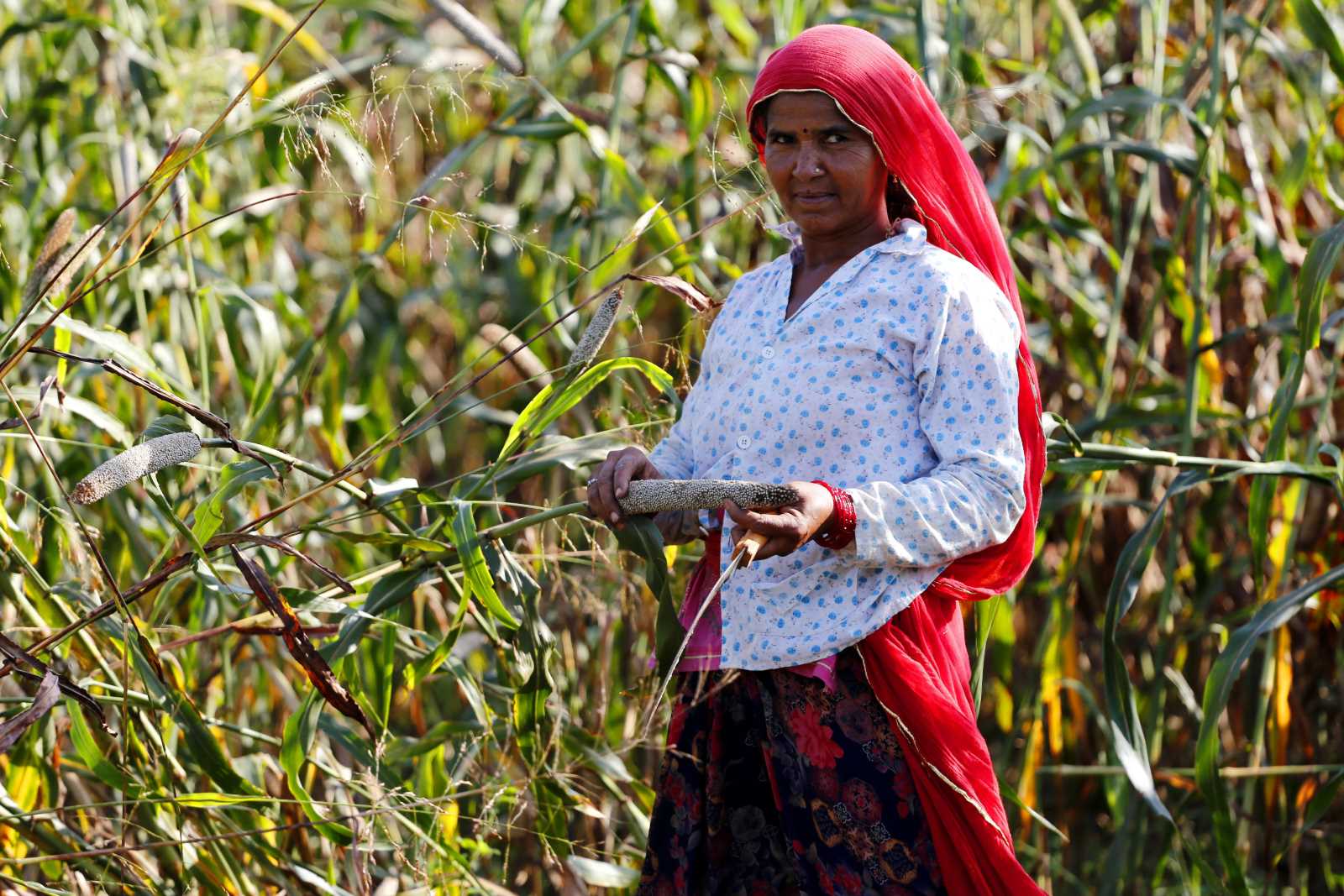Healthy nutrition
It’s all in the mix

The Caribbean island of Hispaniola was once home to abundant flora and fauna. In the 18th century, the western half of the island, which is now Haiti, was France’s wealthiest colony. The colonisers brutally exploited both the people and natural resources, causing a considerable loss of biodiversity among other things. Colonial exploitation started long-lasting negative trends which ultimately made Haiti one of the world’s poorest countries.
Due to deforestation and the resulting erosion, around half of the country’s arable land was lost. Vast areas are no longer suitable for agriculture. Numerous tropical cyclones and the catastrophic earthquake of 2010 left devastation in their wake. Haitian farmers’ harvests, which are meagre in good times, were wiped out.
The reasons why people in Haiti and other countries suffer hunger include not only natural disasters, degraded soils and ruined infrastructure, but also dysfunctional markets, corruption, violent conflict and poor education. Inequalities – between cities and rural areas or between men and women, for example – exacerbate the problems. It is rather challenging to tackle the complex and interconnected causes.
The right to food applies to everyone worldwide
Fighting hunger and malnutrition is one of the global community’s central goals. As early as the 1960s, the UN enshrined the right to adequate food in the Charter of Human Rights. Global attempts to implement this right have met with considerable success, but some 690 million people suffer hunger today according to the UN Food and Agriculture Organization (FAO), and around 2 billion suffer micronutrient deficiencies (see background information). There is reason to doubt that the second Sustainable Development Goal (SDG), to rid the world of hunger and all forms of malnutrition by 2030, will be achieved.
Healthy nutrition is the foundation of a healthy and active life. Humans need energy, fats, carbohydrates, protein, vitamins and minerals. Food ensures that we can grow, regenerate and maintain our bodily functions, including a strong immune system.
Healthy nutrition is of lifelong importance. Babies are born healthy if, in utero, they received all important nutrients. Accordingly, young women should maintain a high-quality diet. That amounts to the best possible care of themselves and their babies when pregnant or breastfeeding. During pregnancy, they need additional micronutrients like folate and iodine. To stay healthy and perform well, however, everyone needs healthy food – women, men, girls and boys.
The first 1,000 days of life – that is the span from conception until a child’s second birthday – are decisive for the development of physical and intellectual abilities. Deficits in this period can lead to irreversible damage. Malnourished babies and children will never reach their full cognitive and physical potential. Instead, it is the starting point of a vicious circle of hunger, malnutrition and poor school performance which reduces labour-market opportunities, leading to poverty – a major cause of malnutrition.
Healthy nutrition is multi-faceted
Whether people’s nutrition is healthy, depends on what kinds of food are available and what quantities of essential nutrients they contain. Combining different food appropriately ensures a balanced nutrient supply. Depending on regions, climate zones and cultural practices, such combinations can look very different. Food has to be free of contamination from cultivation, storage and processing, and it must be accessible and affordable even for poorer people.
Large inequalities between individual countries and within populations make it difficult to implement the recommendations. Undernutrition and overweight now exist simultaneously in most countries. The big difference is how many people are affected by which phenomenon. In Europe, Oceania and large swaths of America, the problem is primarily overweight and obesity. In other countries, broad sections of the population are undernourished, while at the same time, many urban people are overweight. Deficiencies in important micronutrients like iodine and iron are common everywhere. All of these forms of malnutrition have significant impacts on people, economies and national health systems.
Long-term programmes geared to behavioural change through nutrition education can contribute to better diets. Addressing the nutrition of infants and small children has proven successful, for example. In rural Haiti, few people know that the poor health of a very thin child is typically due to that child having been weaned off too early and only getting an inadequate and unbalanced diet. People believe that supranatural forces are to blame and hang traditional amulets around children’s necks to protect them. Undernutrition is not caused by spirits, however, so what the children really need is better food and perhaps the attention of a health centre. Awareness raising can make families aware of these things.
Simply knowing what constitutes a healthy diet is not enough, however. Many factors have an impact on the variety of food people have on their plates. They include cultural preferences and taboos, personal tastes, the time constraints of those who prepare meals, cost considerations, cultivation and seasonal availability.
For many people in developing countries, the main concern in daily life is getting enough to eat. When the majority of a family’s income is spent for food, the general incentive is to get as much food as possible for as little money as possible. Fresh fruit, vegetables and food of animal origin are often unaffordable for such families. Instead, they opt for high-carbohydrate staples or cheap convenience food. In the long run, the result is malnutrition.
Dietary supplements are no panacea
In cases of acute or chronic deficiencies in vitamins or minerals, dietary supplements can certainly help. That is also true in specific situations like pregnancy and breastfeeding. But while enriched or fortified staples help to ensure that micronutrients are broadly distributed within a population, they are no substitute for a balanced diet. The reason is that food is more than the sum of its nutrients. Consuming a variety of phytochemicals has a positive impact on a person’s metabolism and boosts the immune system. The relevant nutrients, however, are only contained in natural food, in which they are typically “packaged” in ways that allow the body to absorb them slowly. By contrast, incorrect doses of dietary supplements do not have any effect because consumers’ bodies eliminate them fast.
Administering micronutrients, moreover, does not address the structural causes of malnutrition. To do that, effective policies are needed, and healthy diets must be the goal. Long-term education and awareness raising can help to change even deeply ingrained behaviours. On the other hand, costs determine how diverse a family’s diet is. In this regard, governments and food producers bear a great responsibility. They must ensure that healthy diets are feasible, available and affordable – even in the most remote corners of the earth.
In Haiti, cross-sector approaches have proven successful. They link nutrition education to sustainable agriculture, better hygiene and safe drinking water. It is essential to involve local and regional authorities in the planning and implementation of measures. Lasting improvements will only be achieved, however, if both policymakers and the local communities concerned consider healthy nutrition to be important.
Simone Welte is a nutrition advisor at Welthungerhilfe.
simone.welte@welthungerhilfe.de












